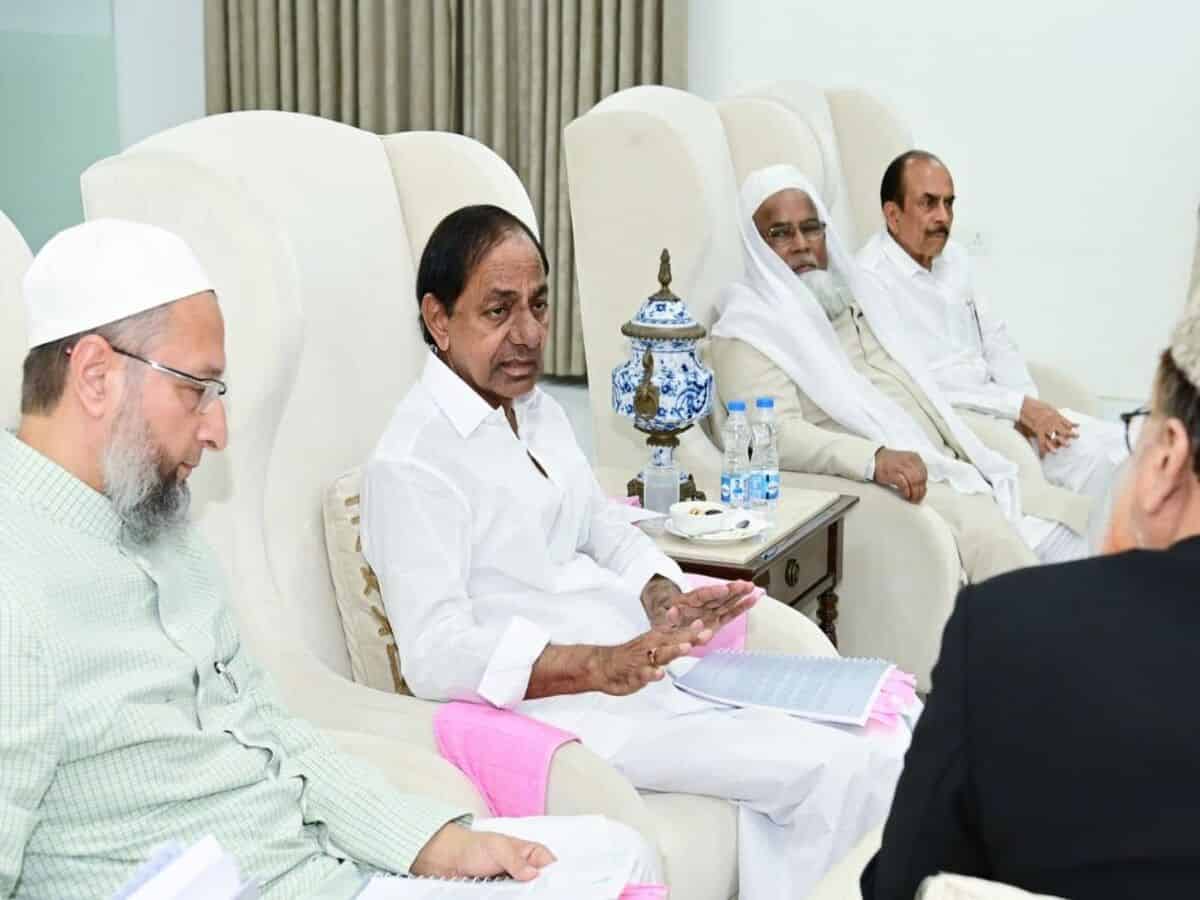
Hyderabad: Telangana chief minister K Chandrasekhar Rao on Monday said that the BJP-led Union government, which ignored development and created enmity between people, was now conspiring to divide people again in the name of Uniform Civil Code (UCC).
KCR said that India is blessed with multiple cultures, traditions, castes, and religions and stands as a role model in advocating unity in diversity to the world.
BRS to oppose UCC
To safeguard India’s diversity, the Bharat Rashtra Samithi (BRS) is vehemently rejecting the bill, he told a delegation of All India Muslim Personal Law Board (AIMPLB), which urged him to oppose UCC if a bill is brought in the Parliament.
The Chief Minister made it clear that the BRS has been opposing the Union government’s decisions which are detrimental to the unity of the people of the country. He noted that tribals with their unique culture, different castes and religious people including Hindus were left in confusion and worried about the UCC.
The AIMPLB, led by its President Khalid Saifullah Rahmani, met KCR at the Pragati Bhavan. The Board requested the CM to oppose the UCC bill which is a stumbling block to the very existence of people of the country and their inherited traditions and cultures.
AIMIM President and Hyderabad MP Asaduddin Owaisi, MLA Akbaruddin, ministers Mahmood Ali, KT Rama Rao, Board executive members and others participated in this meeting.
Imposition of UCC is a malicious attempt: KCR
On this occasion, KCR said: ”It is clear that the imposition of UCC is a malicious attempt by the Union government. The BJP government has been ignoring the development of the country and people’s welfare for the last nine years. The BJP plotted to instigate people by promoting divisive politics by raking up clashes between the communities to derive political benefits through the UCC bill. It is the main reason, we are opposing the UCC bill which is being introduced by the BJP led government soon.”
He made it clear that the BRS will oppose the UCC bill in the ensuing Parliament session. Apart from this, the BRS ill fight on the UCC bill by uniting all like- minded political parties. The CM directed the parliamentary party leaders K. Keshava Rao and Nama Nageshwar Rao to prepare an action plan to fight against the Centre in both the houses of Parliament.
Meanwhile, the AIMPLB thanked CM KCR for opposing the UCC bill and for supporting their endeavour to safeguard the ‘Ganga Jamuni Tehzeeb’ and protect the customs of all sections of people irrespective of religions and regions.
Uniform Civil Code
The debate for a UCC is not new. It dates back to the colonial period in India. In 1835, a report was submitted advocating for a common set of laws, but it clearly mentioned that personal matters should not be under the purview of codification. The British introduced the Indian Penal Code (IPC), which is the official criminal code of India, but they left civil matters untouched.
Currently, India has a common criminal code but lacks a common civil code. Personal laws in India vary based on the major religions in the country. For example, Hindus are governed by the Hindu Marriage Act 1955, the Hindu Succession Act 1956, the Hindu Minority & Guardianship Act 1956, and the Hindu Adoption & Maintenance Act 1956.
Other personal laws are the Muslim Personal Law (Shariat) Application Act 1937, the Dissolution of Muslim Marriage Act 1939, the Indian Christian Marriage Act 1872, the Parsi Marriage and Divorce Act 1936, and the Sikhs’ Anand Marriage Act 1909.
In addition to personal laws, there is a religiously neutral law called the Special Marriage Act 1954.
Article 44 of the Indian Constitution, which falls under the Directive Principles of State Policy (DPSP), states that “The State shall endeavour to secure for the citizens a uniform civil code throughout the territory of India.” However, as the article is under DPSP, it is not justiciable as a fundamental right. The constitutional makers placed it under DPSP because, at the time of independence, it was not feasible to implement a uniform civil code. They left it for future governments to implement when the nation is ready.
Though the debate for UCC began again, the fundamental question still remains unanswered, ‘Is it feasible for a diverse country like India to achieve uniformity in personal laws?’
With inputs from IANS

